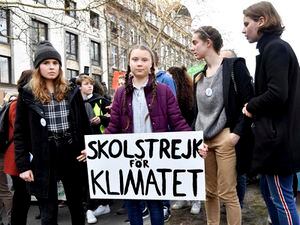Climate change cannot be ignored any longer
It is unlikely Marc Bolan had climate change on his mind when he sang ‘you won’t fool the children of the revolution’, but due to inaction from politicians and despite the dismissive attitude of ‘deniers’, it is the kids who have dragged the biggest issue of our age back into the global consciousness, says Nick Mann

WATCHING politicians around the globe marching towards a climate catastrophe makes for pitiful viewing.
We are living in a time when too many people not only ignore overwhelming scientific consensus but the evidence before their own eyes and too few are willing to act.
It is an age where to distrust experts and be contrary has become increasingly normalised, and views can be echoed and amplified to the point where falsehoods become trusted truths.
To deny global warming and the effects it can have is the easy option for societies that are more interested in their own immediate comfort and lifestyle than any future implications.
Climate science by its nature is based on large timescales, the unknowns that are unprovable are relied on by deniers, so much so that it now seems it is only in emergencies where determined action will be taken.
That is a disgrace.
Too many people are either wilfully ignoring the future being lined up for generations to come, or waiting for a technological miracle to rescue the situation.
Political leaders are stuck in a cycle of climate delay – unwilling to contemplate determined action that would be unpopular to many.
We have all got used to being consumers, to desire more, and rely on that for our happiness.
We are selfish and shortsighted because that is the course of least resistance, or because that is what we think we have earned.
It is an attitude that is amplified in an island community where small actions can be easily dismissed as ineffectual – or that our role is simply to wait for the US, China, or Europe to solve the problem.
Waiting, so many are waiting.
And that is why it is so heartening to see younger generations acting to move climate change right back up the agenda.
Across the world, students have been leaving schools to demand action – their message is clear and should be obvious – we do not have time to waste.
These strikes have their roots in the action of Swedish pupil Greta Thunberg.
The 15-year-old skipped classes to sit outside government buildings in September, accusing her country of not following the Paris Climate Agreement.
The political response has been at times condescending and painful to watch. In Hamburg, as strikes happened on Friday, education official Ties Rabe wrote on Twitter: ‘No one makes the world better by skipping school.’
In the UK earlier in February, organisers Youth Strike 4 Climate said protests took place in more than 60 towns and cities, with an estimated 15,000 taking part.
Some placards had a simple message: ‘There is no planet B.’
Greta tweeted about the UK protests, writing: ‘British PM says that the children on school strike are “wasting lesson time”. That may well be the case. But then again, political leaders have wasted 30 years of inaction. And that is slightly worse.’
More action is being co-ordinated for 15 March.
In an uncompromising open letter, pupils involved have said: ‘We are going to change the fate of humanity, whether you like it or not.’
Guernsey pupils, too, are organising to move climate issues up the agenda here with a target of carbon neutrality by 2030.
Remember that this is an island that has failed to agree on an energy policy, that meets current emission targets only by plugging in to France, where there are over 83,000 vehicles registered and where the impacts of climate change will be serious and expensive to deal with.
You need only take one look at sea-level change modelling to understand that.
Those who do not want to face the uncomfortable truth of climate change will often pick away at the hypocrisy of those wanting action.
That they drove to a protest, or they flew to a conference, or they used a mobile phone made in Japan to tweet their thoughts.
And you have to hold your hands up and say that, yes, there is a hypocrisy in all of us.
But that does not make inaction right or justified.
Politicians talk of the need to think long term but always act in the immediate, in election cycles.
It is one of the reasons why it is very difficult for any issue to get a foothold in Europe right now apart from Brexit – it has strangled the conversation.
The fear must be that if we allow societies to become increasingly inward looking, as they are, acting purely in their own immediate interests, we will normalise a system ill-equipped to tackle international issues that will respect no arbitrary line on a map.
The younger generation willing to speak up on climate change should be applauded, their voice should be heard and reacted to.
This is no time for political condescension, but for a fundamental shift in approach on every scale.





